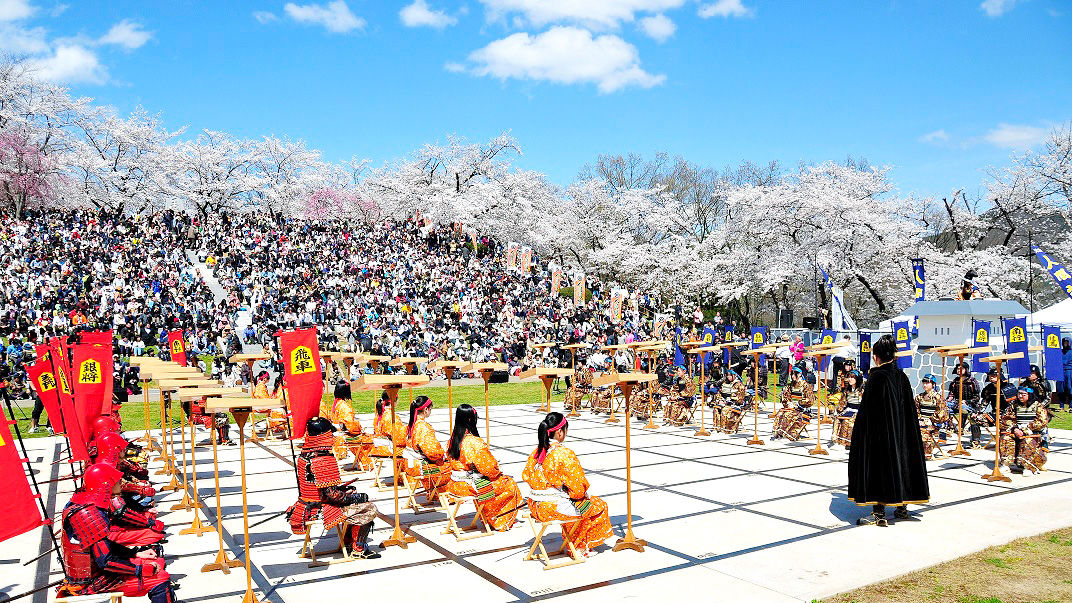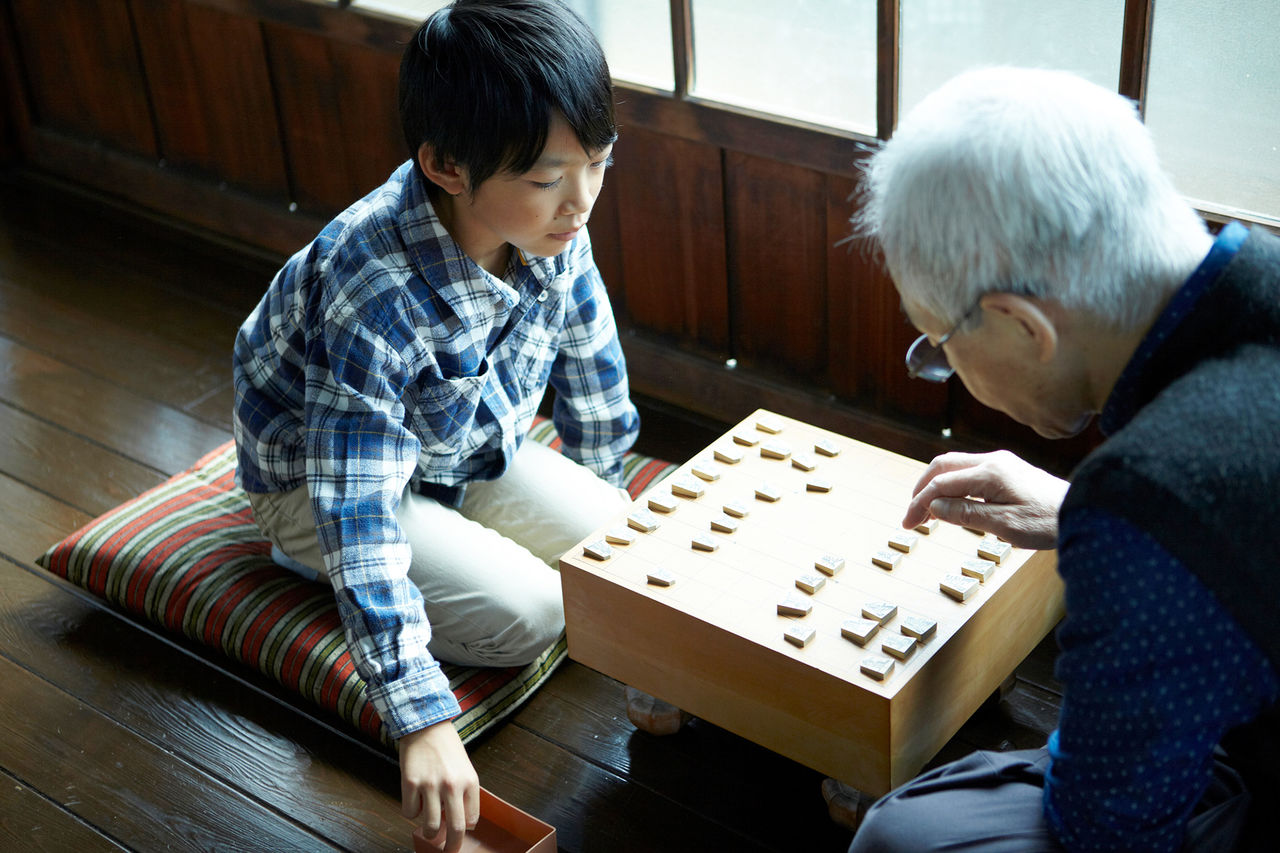
Tendō, Yamagata: Fantastic Fruit and Sake from the Home of Human “Shōgi”
Guideto Japan
Culture- English
- 日本語
- 简体字
- 繁體字
- Français
- Español
- العربية
- Русский
A Life-Size Board Fit for a Shōgi King
Yamagata, the capital of the prefecture bearing the same name, is located about 400 kilometers away from Tokyo but is easily accessible from Japan’s capital, around two and a half hours on the Yamagata Shinkansen from Tokyo Station or just under two hours by airplane from Haneda International Airport. Adjacent to the city of Yamagata lies Tendō, a city that offers something special when springtime rolls around: matches of shōgi, an ancient Japanese board game similar to chess, played on a massive board by people taking the place of the pieces.
 An E3-class Tsubasa Yamagata Shinkansen.
An E3-class Tsubasa Yamagata Shinkansen.
The city of Tendō has been known since the days of the Tokugawa Shogunate (1603-1868) for producing high quality shōgi pieces, and to this day produces more of them than anywhere else in the country. Every spring, surrounded by swaths of drooping pink shidare-zakura cherry trees, the city holds matches of human shōgi to celebrate Tendō’s affinity for the game.
Much like the games of human chess held in Tendō’s sister city of Marostica, Italy, the “pieces” all deck themselves out in full warrior attire, from the pawns in their simple kimono to knights with lances and full sets of armor. The participants then serve under the command of professional shōgi players.
Human shōgi got its start back in the late sixteenth century, when the military ruler Toyotomi Hideyoshi held a match at Fushimi Castle in Kyoto under the cherry blossoms, using his pages and chamber maids as the pieces. Human shōgi in Tendō nowadays is held in Tendō Park, located at the top of Mount Maizuru in the southeast part of the city. With 2,000 cherry trees, the park is a sight to behold in the springtime.
 A shōgi king piece made from stone sits atop Mount Maizuru.
A shōgi king piece made from stone sits atop Mount Maizuru.
Being the spectacle that it is, the game of human shōgi does not get started right away. First the participants, dressed in full medieval armor, split into two factions, the eastern and western armies. They pull out swords and act out a fierce battle on the playing field, accompanied by the resounding beat of taiko drums. The fighting drags on without a clear victor before it is announced that the contest shall be settled with a game of human shōgi, and the match commences. The game, held on a board more than 16 meters long and 14 meters wide, resembles something out of an ancient picture scroll.
 The human shōgi players prepare to begin the match. (© Tendō City Tourism Committee)
The human shōgi players prepare to begin the match. (© Tendō City Tourism Committee)
 A game of shōgi played on a traditional board.
A game of shōgi played on a traditional board.
The games last for two days, with a match on the first day orchestrated by professional female players in command of the troops and another on the second day by their male counterparts. (This year’s matches took place on April 21 and 22, as part of the 2018 Tendō Cherry Blossom Festival, which ran from April 8 through May 6.) Though the rules of human shōgi are the same as when played on a board, there is an unspoken rule that every single piece must move at least once during the match. The only requirement to participate as a piece, whether an armored warrior or a kimono-clad chamber maid, is to be at least age 16. This is a full-fledged festival, with stalls and booths offering plenty of refreshments, and it is no wonder that the event typically draws about 50,000 spectators a year.
The Famous Fruit and Sake of the North
Besides shōgi, Tendō is also famous for its delicious fruit. Known as the “kingdom of fruit” in Japan, Yamagata Prefecture yields a wide variety of different produce in large quantities. While most sake brewers throughout Japan grow rice in the warm months and make sake in the winter, many of the sake brewers in Tendō grow fruit as well.
Fully 70% of the cherries grown in Japan come from Yamagata Prefecture, which also boasts the title of the number-one producer of La France pears in the nation. Visitors to Yamagata during the growing season can enjoy everything from peaches, grapes, and apples to muskmelons and watermelons. There are plenty of farms where people can pick their own fruit and enjoy sweets made from fresh produce just off the tree.
Yamagata is also a popular destination for lovers of both wine, made with the prefecture’s high-quality grapes, and sake. The smooth and clear sake produced in Yamagata made the prefecture the first in Japan to receive a geographical indication, giving its producers the exclusive right to use the name “Yamagata sake” for their drinks. According to these producers, the reason their sake is so delicious is the large temperature fluctuation between night and day in northern Honshū, along with the region’s clearly defined seasons, and their use of water sources originating from snowmelt.
 Yamagata cherries pop with mouthwatering red color.
Yamagata cherries pop with mouthwatering red color.
Tendō is home to one of the nation’s most prominent sake breweries. Dewazakura Sake Brewery exports its products to over 25 markets worldwide. After picking up a bottle as a souvenir, wander over to the Dewazakura Museum. The museum, split between the main manor built at the beginning of the twentieth century and the storehouse, features porcelain and other handicrafts collected by the brewery’s third-generation owner, Nakano Seijirō. Art connoisseurs should also make their way to the Hiroshige Museum of Art, which houses many of the works by the renowned woodblock artist, and the Tendō City Museum of Art.
 The classical architecture of the Dewazakura Museum. (© Sandō Atsuko)
The classical architecture of the Dewazakura Museum. (© Sandō Atsuko)
Domannaka bentō boxes, a local favorite
Tendō’s hot springs area is just a 10-minute drive from Yamagata Airport or a 15-minute stroll from the Shinkansen station. At Tendō Kōgen, skiers and snowboarders can enjoy cruising the slopes before hopping in one of the area’s hot springs to rejuvenate their tired bodies. The city even has free foot baths for those just looking for a quick pick-me-up.
Before hopping on the plane or train home, many travelers pick up a Beef Domannaka bentō boxed lunch (¥1,250). The region’s plump and fluffy rice, known by the Domannaka name, is topped with savory beef slices and and minced meat. Another popular souvenir is zunda-mochi, rice covered in mashed edamame soybeans. This snack is beloved throughout the Tōhoku region for its delicate sweetness and its texture.
Despite its ease of access, just hours from Tokyo, Tendō, Yamagata, is a chance to experience a completely different side of Japan, placing it high on the list as a getaway destination from the hustle and bustle of city life.
 The Beef Domannaka bentō box (left) and zunda-mochi, sticky rice with mashed edamame.
The Beef Domannaka bentō box (left) and zunda-mochi, sticky rice with mashed edamame.
(Originally written in Japanese. Banner photo: The pieces prepare for their human shogi match. © Tendō City Tourism Committee. )